Is Liquid Diet Good For Weight Loss? Types, Menu Plan, Benefits & Side Effects
Everything you need to know about the types of liquid diet to enhance body metabolism.

Image: StyleCraze Design Team
A liquid diet involves consuming clear liquids. Bone broth, water, or juices without pulp are the foods that doctors allow.
Going on an unsupervised liquid diet for weight loss is not recommended. However, if your doctor permits, you can use this diet for no more than one day to flush out toxins and kickstart your metabolism. Do not follow it for more than a day as it can be unsafe.
Also, liquid diets may vary, depending on individual needs, health conditions, and specific recommendations from a healthcare provider. So, understanding their types is important for anyone considering this diet for weight loss. Explore everything about liquid diets, including their types, benefits, dangers, and diet charts in this article. Scroll down!
In This Article
What Is A Liquid Diet?

Liquid diets (also called clear liquid diets) are low-calorie foods that are liquid at room temperature (1). This ‘juice cleanse’ diet may boost your hydration levels and help with weight management.
You can either replace one or two meals of your day with liquid foods or go on a total liquid diet. In a liquid diet, you will be consuming calories in liquid form.
 Fun Fact
Fun FactYou can juice fruits and veggies, make smoothies, or have soup. Low-calorie, high-protein meal replacement shakes also help in body transformation. This diet is most often used for weight loss, but how good is it?
Key Takeaways
- Food intake in liquid form or substituting one or two of your daily meals with liquid foods is a liquid diet. However, follow this diet for no more than a day.
- Smoothies and juices are a good source of dietary fiber, vitamins, minerals and antioxidants that can help tackle oxidative damage.
- A liquid diet helps promote weight loss and improve health. Alongside this diet, incorporating a balanced calorie intake can provide the essential nutrients required by the body.
- It helps to save time, boost the metabolic rate, detoxify the body, and support the digestive system.
How Do Liquid Diets Help In Weight Loss?
Liquid diets are the go-to diets for many dieters. This is because they help save time, improve metabolic rate, detoxify the body, and support the digestive system, resulting in weight loss and better overall health. Listed below are the ways liquid diets could aid weight loss.
1. Low In Calories
Liquid diets are low in calories as they consist of watery-clear fluids. Studies in The American Journal of Clinical Nutrition showed that very-low-calorie diets, including a liquid diet consisting of no more than 500 calories a day, could be effective in reducing weight. This type of diet could work better compared to a low-calorie diet or a restricted normal food diet. The study investigated the effectiveness of a commercial weight-loss program in Sweden, which includes liquid-formula very-low-calorie diets (VLCDs), low-calorie diets (LCDs), and restricted normal-food diets. The observational cohort study followed participants over a year, linking their weight-loss progress with national health data. Results showed significant weight loss across all diet types, with the VLCD group experiencing the greatest average weight reduction of 11.4 kg (2).
When you consume fewer calories, your body will start using up the stored glycogeni A form of glucose stored in the muscles and the liver and is the primary energy source for the body. or fat as the source of fuel. This, in turn, could lead to slimming and weight loss.
A study published in The International Journal of Obesity showed that a low-calorie diet or very low-calorie diet resulted in muscle glycogen depletion for a short period. Body fat also decreased, resulting in weight loss (3).
2. Detoxify Your Body
Liquid diets are an excellent way to detoxify your body.
The juices/broths/smoothies are rich in vitamins, minerals, and dietary fiber. Rat studies have shown that fruit or vegetable juices are rich in antioxidants and can prevent oxidative damagei Cell damage caused by unstable oxygen molecules and failure of the body to eliminate these molecules. (4).
The dietary fiber helps cleanse the digestive tract and improves gastrointestinal health (5). Both these actions could have a beneficial impact on weight loss. Many people also consume detox drinks for weight loss as part of their liquid diet. These drinks enhance the detoxification process and support weight loss.
3. Nutritious

Liquid food in the juice or smoothie form offers rich nutrition. Remember to drink the juice/smoothie immediately if you are using a centrifugal blender.
Replacing your dinner meal with low-calorie liquid foods improves body composition parameters and may also aid weight loss. In a study, the group of subjects who took a liquid meal replacement seemed to have better weight parameters. The study published in the Journal of Obesity examined the effects of a 388 kcal dinner meal replacement in overweight and obese individuals from a Chinese population. It was conducted as a randomized controlled trial with 174 participants, divided into two groups– the intervention group got meal replacements and the control group followed their regular diet. Over 12 weeks, significant improvements in body weight, BMI, waist circumference, fat-free mass, and body fat mass were observed among the intervention group, along with notable metabolic improvements like reduced blood glucose. Additionally, male participants (from the intervention group) showed specific improvements in visceral fat area and blood pressure, highlighting the importance of gender-specific analysis in nutritional interventions (6).
Maintaining a balanced calorie intake along with a liquid diet throughout the day can help provide the required nutrients to the body. It also improves fitness and general wellness.
4. Easy On The Digestive System
Juices/smoothies/broths are easy on your digestive system. They aid in proper digestion, absorption, and excretion. Moreover, the little dietary fiber and water in the liquid diet (by including pulp in juices or smoothies) can keep you full for a long duration. Following a juice diet for weight loss may be an effective way to stay nourished while reducing your calorie intake. As per one study, a liquid meal replacement was found to have more fiber than a solid meal replacement. The study published in Hormone and Metabolic Research investigated the effects of solid versus liquid meal-replacement products on hunger, satiety, and appetite-regulating hormones in older adults. Nine participants consumed meals that provided 25% of their daily energy needs in either solid or liquid form. The results showed that solid meal replacements significantly reduced post-meal hunger and desire to eat compared to liquid versions. Additionally, insulin and ghrelin levels were lower after consuming the solid meal, with ghrelin remaining suppressed for four hours. This study highlights that solid and liquid meal replacements, despite similar energy content, elicit different responses and are not dietary equivalents for older adults (7).
5. Convenient
You don’t have to wait for the pan to heat up or scroll through recipes online.
You may simply toss all the ingredients into a blender, and your breakfast/lunch/dinner is ready.
This is a major advantage, more so if we tend to skip a meal or order unhealthy food as cooking could be a time-consuming process. Starving or eating unhealthy could only lead to weight gain in the long run.
These are the many advantages of following a liquid diet. Before you decide to give the diet a go, it is important to consult with a healthcare professional. This will help ensure it aligns with your weight loss goals without affecting your health.
The diet is available in different types, and in the following section, we will explore those.
Types Of Liquid Diets For Weight Loss
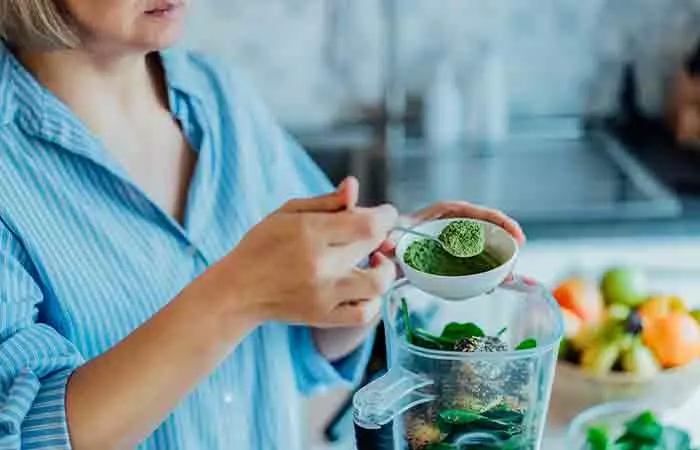
For beginners, following a liquid diet can be tough. Also, if you are not comfortable going on a complete liquid diet, you have an alternative. Here, we have discussed the different types of liquid diets. Remember to talk to your doctor/dietitian before trying any of these.
1. Detox/Cleansing Liquid Diet
Detox or cleansing liquid diets have gained popularity in the recent past. They may help to detoxify your body, and you may see some results when you go on a detox liquid diet once a week for a month.
In this diet, you will only drink vegetable/fruit juices with herbs for a day. It will not only be a new experience but also can feel refreshing. A few examples of detox/cleansing liquid diets are water fasting and the Master Cleanse.
However, research on detox diets is very limited. We suggest you speak to your doctor about the safety of such diets (8).
2. Meal Replacement Liquid Diet
Meal replacement liquid foods or shakes are low in calories and could be effective in weight loss.
Certain liquid meal replacement products are high in protein and fiber and low in fat. These could be more effective in regulating appetite and curbing hunger pangs. Some research suggests that liquid meal replacement diets could be as satiating as solid meal replacement diets (7).
The shakes or juices that you take in the place of a full breakfast or lunch are usually low in calories. They can also contain all the macronutrients (protein, carbs, and fat) and most micronutrients (vitamins and minerals)
These products are specifically designed to replace solid foods (which may have a higher total calorie count per serving).
3. Medical Liquid Diet

This diet is not for weight loss. You need special attention and supervision by a doctor. This liquid diet is prescribed by a doctor to prep a patient for surgery in the near future or help them recover from an injury. This diet could also be prescribed to ease digestion issues.
Medically prescribed liquid diets require the patients to be on a clear liquid diet. They can only drink water, broth, apple juice, popsicle, syrup, and teas.
Takeaway Point: If you are comfortable, you can go on a detox diet plan for a day. But for weight loss, it is recommended to go on a meal replacement diet. This will ensure that you get the benefits of solid food as well as liquid juices/broths. If weight loss is your goal, you may want to skip the medically prescribed liquid diet and check out other liquid diet meal ideas instead.
 Trivia
TriviaDetox Liquid Diet Chart
| MEALS | WHAT TO DRINK |
|---|---|
| Early Morning (6:00 a.m.) | 1 cup water with the juice of half a lime |
| Breakfast (7:00 a.m.) | Orange, pomegranate, melon seed powder, and a mint smoothie |
| Mid Morning (10:00 a.m.) | Apple juice |
| Lunch (12:30 p.m.) | Cucumber soup + 1 cup chicken broth |
| Post-lunch (3:30 p.m.) | Buttermilk or Herbal tea |
| Dinner (7:00 p.m.) | Blended squash or Mushroom soup |
Tip:
Drink flavored water to keep your hunger at bay.
We have an alternative liquid diet chart that may suit your needs.
Meal Replacement Liquid Diet Chart
| MEALS | WHAT TO DRINK |
|---|---|
| Early Morning (6:00 a.m.) | 1 cup water with the juice of half a lime |
| Breakfast (7:00 a.m.) | Blueberry, oatmeal, dates, 2 almonds, and milk smoothie/meal replacement low-calorie shake |
| Mid Morning (10:00 a.m.) | 1 glass egg nog + 1 cup green tea |
| Lunch (12:30 p.m.) | Mushroom or lentil soup + 1 glass vegetable juice (with pulp) |
| Post-lunch (3:30 p.m.) | Buttermilk with nut powder |
| Dinner (7:00 p.m.) | Vegetable broth with grilled fish/chicken/meal replacement low-calorie shake |
Since the diet is low in calories, you may find it hard in the beginning. But it’s just for a day, and you will soon get used to it.
Tip: Do not do vigorous exercises on this day. You may do some light stretching, go for a slow-paced walk, or meditate.
Are you thinking these are the only foods you are allowed to eat? Well, no. In the following section, we have listed out the liquid diet foods you can include in your meal plan.
Foods You Can Eat
- Fruits and veggies
- Soy/almond/full-fat milk
- Yogurt and low-cal frozen yogurt
- Raw or scrambled eggs
- Tea/coffee
- Popsicles
- Water
- Cold-pressed juices
- Honey/syrup
- Sports drinks
- Ice cream
- Flavored water
- Broth
- Creamed soup
- Lean protein like fish, chicken, lentils, beans, tofu, mushroom, and soy
- Sorbet
- Herbs
If you are on a detox diet, avoid all types of food in the solid form. You can instead juice them or make a smoothie and consume them. If you want to opt for meal replacements, you can include solid foods (but do ensure you have at least two liquid meals).
Transitioning to or from a liquid diet can be challenging, but following these tips can help ensure a safe and smooth process:
- Consult a healthcare provider before starting or ending a liquid diet.
- Gradually replace meals with liquid options or reintroduce solid foods slowly. This helps avoid upsetting the digestive system.
- Monitor your health and how your digestive system reacts to the changes, and adjust the diet as needed.
- Choose nutrient-dense liquids like protein shakes and broths. Maintain a balanced intake of essential nutrients throughout the transition.
- Eat small, frequent meals when reintroducing solids. This helps ease the digestive system back into solid food.
- Stay hydrated and maintain adequate water intake throughout the transition.
These tips will help ease the transition process. However, no matter how carefully you go, this diet is not for everybody. In the section below, we have listed those groups of people who should avoid opting for the liquid diet. Read on.
Who Should Avoid The Liquid Diet?
Though the liquid diet is good for weight loss, it should be avoided by:
- Pregnant and lactating women
- Children
- Older adults (unless their doctor recommends)
Benefits Of The Liquid Diet

- It could help in detoxification.
- If the liquid diet is low in fiber, it can give the digestive system the required rest (9).
- It improves skin quality.
- It is helpful for those with a painful wisdom tooth.
- It may be useful for those with cancer of the mouth, esophagusi Also known as the food pipe, a thin and muscular tube that carries food from the throat to the stomach. , or gums.
- It reduces stomach ulceri Open sores that develop on the lining of the stomach, intestines, or esophagus due to bacterial infection. pain.
- In some cases, the liquid diet could be useful for people who have undergone surgery of the stomach. It may help them transition to solid foods, though it may not be necessary in majority of the cases (10).
Like any extreme diet, a liquid diet can also turn dangerous if you follow it continuously for days. Take a look at its possible side effects.
Possible Dangers Of The Liquid Diet
, MPH, a registered dietitian, says, “When it comes to weight loss and maintenance, a balanced diet with protein, fiber, and fat is needed to achieve long-term goals. A purely liquid diet often lacks fiber, which is an important component of blood sugar management. Diets which lack fiber often lead to spikes in blood sugar, which, in turn, will cause increased cravings and overeating.”
Here are the dangers of being on a liquid diet continuously for too long:
- Your immunity will become weak.
- You will feel light-headed and dizzy.
- Cravings for food may increase, leading to overeating.
- It can lead to muscle loss and weaken your bones.
- It may prevent proper brain functioning.
- It may lead to mood swings and irrational thoughts.
- It makes you prone to cough and cold.
- Causes nausea.
There is little research substantiating these side effects. But as per anecdotal evidence, following the liquid diet for several days could cause any of the above-mentioned side effects.
Liquidized diet is easy to consume and is often recommended to provide nutrition for people with certain health conditions. Check them out in the next section.
Indications For A Full Liquid Diet
General liquid diet indications are as follows:
- Dysphagia
Liquid diet with a slightly thicker consistency may help with safe and smooth swallowing to avoid choking (11).
- Postoperative Recovery
It aids in healing by offering easy-to-digest nutrients after surgery (12).
- Oral Surgery Or Dental Issues
Recommended for patients after dental procedures or oral surgery to avoid chewing solid foods.
- Acute Pancreatitis
It provides digestive rest and minimizes abdominal pain and pancreatic enzyme secretion during acute phases (13).
- Irritable Bowel Syndrome (IBS)
It may increase stool frequency and minimize digestive irritation during IBS flare-ups (14).
Infographic: Flavored Water Recipes For Liquid Diet
A liquid diet helps one lose weight, revs up metabolism, and flushes out toxins effectively. However, one may feel it monotonous to drink only water to curb the thirst. Hence, flavored water can be a good choice.
The following infographic lists a few recipes for flavored water. Check them out! Illustration: StyleCraze Design Team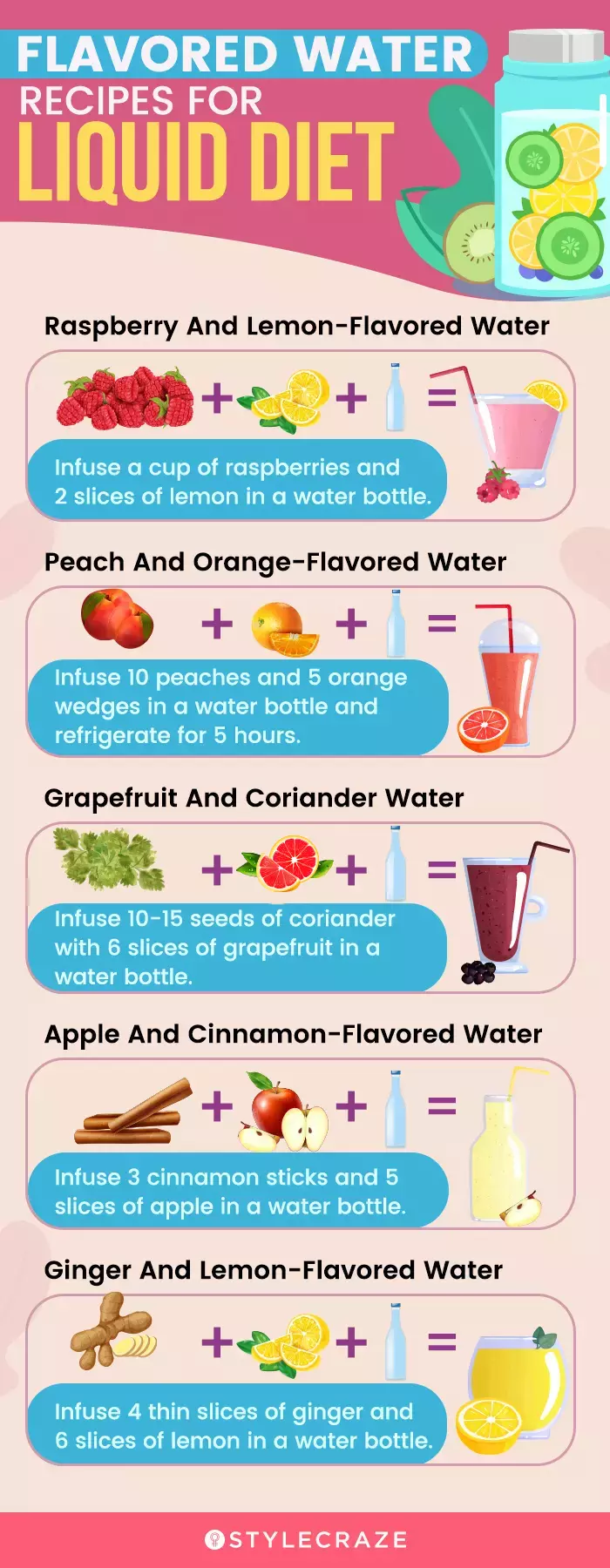
If you were confused about the liquid diet before, we hope the article thoroughly answered your question of “what is a liquid diet?” It involves replacing all or some meals in a day with clear fluids like broths, juices, and soups. A liquid diet for weight loss can work by drastically cutting down the number of calories consumed in a day and detoxifying the digestive system. However, it is not a plan that should be used long-term as it can cause loss of muscle mass and manifest in other side effects and health concerns. Avoid this diet if you are pregnant, lactating, underage, or above 60 years of age (unless prescribed by your doctor).
Frequently Asked Questions
How much weight can you lose on a liquid diet?
In a liquid diet, all forms of solid foods are restricted, and you are encouraged to take more of liquid foods and drinks. You may be able to lose 10-20 pounds in about 10 days.
How much weight can you lose on a 3-day liquid diet?
You may be able to lose 5-10 pounds on a 3-day liquid diet. This loss also depends on your body type and metabolic rate.
Can you eat eggs on a liquid diet?
Yes, you can eat eggs on a liquid diet. You can mix an egg with your smoothie or consume egg nog or a soft poached egg.
What is the best drink for a liquid diet?
A liquid diet is mainly based on liquid foods. Hence, any liquid food or juice with a proper nutrient balance can work well. You can choose fruit or vegetable juice, dal soup, chicken broth, etc. If this is your first time trying a liquid fast, consider starting with a souping diet. Nutrient-rich soups provide sustenance while staying within liquid diet guidelines.
Does a liquid diet shrink your stomach?
Liquid diet hardly contains any solid substances and is low in calories. This may cause your stomach to shrink.
Does a liquid diet cause diarrhea?
A liquid diet may cause diarrhea only if it is devoid of the important nutrients. If the diet is well balanced and is nutritious, it may not cause diarrhea.
How long should you be on a liquid diet?
It is recommended not to follow a liquid diet for more than 3 days. As you are not allowed to eat solid foods, extending this diet for a longer duration can make you feel lethargic. It may also cause the side effects discussed in the article.
Does a liquid diet reduce belly fat?
While a liquid diet by itself may not always reduce belly fat, the intake of more protein in the diet can help (15).
Are mashed potatoes OK for a liquid diet?
No, a liquid diet does not include mashed potatoes.
Is peanut butter allowed on a liquid diet?
Yes. Nut butter, like peanut butter, can increase your caloric intake and is allowed on a liquid diet.
Can I eat cheese on a liquid diet?
No. Hard and soft cheese should be avoided on a liquid diet.
Can you have applesauce on a clear liquid diet?
Yes. You can have applesauce on a clear liquid diet. However, check with your doctor before consuming it.
Can you have a solid bowel movement on a liquid diet?
If you are on a full liquid diet for a long time, you may become constipated due to a lack of fiber.
What kind of Jell-O can you have on a clear liquid diet?
Plain gelatin (Jell-O) with lime, peach, gelatin, and watermelon flavors can be included in a clear liquid diet.
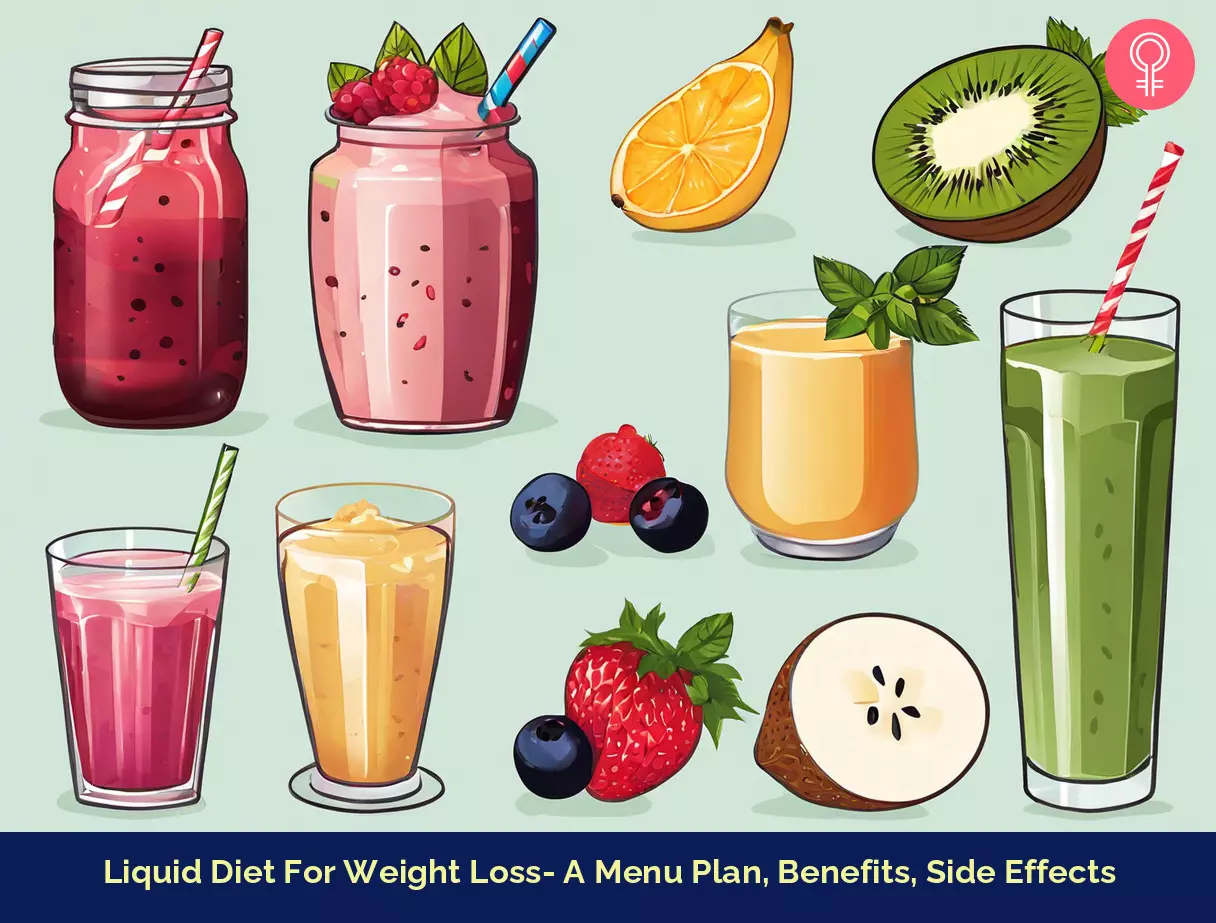
Image: Stable Diffusion/StyleCraze Design Team
Curious about what’s allowed on a full liquid diet? Play this helpful video guide that explains permissible foods, offering valuable insights for those following this dietary restriction.
References
Articles on StyleCraze are backed by verified information from peer-reviewed and academic research papers, reputed organizations, research institutions, and medical associations to ensure accuracy and relevance. Read our editorial policy to learn more.
- Clear Liquid Diet, US National Library of Medicine, National Institutes of Health.
https://www.ncbi.nlm.nih.gov/books/NBK538500/ - Weight loss and dropout during a commercial weight-loss program including a very-low-calorie diet, a low-calorie diet, or restricted normal food: observational cohort study, The American Journal of Clinical Nutrition, US National Library of Medicine, National Institutes of Health.
https://www.ncbi.nlm.nih.gov/pubmed/22990030 - Loss of total body potassium during rapid weight loss does not depend on the decrease of potassium concentration in muscles. Different methods to evaluate body composition during a low energy diet, International Journal of Obesity and Related Metabolic Disorders, US National Library of Medicine, National Institutes of Health.
https://www.ncbi.nlm.nih.gov/pubmed/10702758 - Vegetable and fruit juice enhances antioxidant capacity and regulates antioxidant gene expression in rat liver, brain and colon, Genetics and Molecular Biology, US National Library of Medicine, National Institutes of Health.
https://www.ncbi.nlm.nih.gov/pmc/articles/PMC5409777/ - Dietary fiber and prebiotics and the gastrointestinal microbiota, Gut Microbes, US National Library of Medicine, National Institutes of Health.
https://www.ncbi.nlm.nih.gov/pmc/articles/PMC5390821/ - Effects of a Meal Replacement on Body Composition and Metabolic Parameters among Subjects with Overweight or Obesity, Journal of Obesity, US National Library of Medicine, National Institutes of Health.
https://www.ncbi.nlm.nih.gov/pmc/articles/PMC6327254/ - Effects of Solid versus Liquid Meal-replacement Products of Similar Energy Content on Hunger, Satiety, and Appetite-regulating Hormones in Older Adults, Hormone and Metabolic Research, US National Library of Medicine, National Institutes of Health.
https://www.ncbi.nlm.nih.gov/pmc/articles/PMC2197163/ - Detox diets for toxin elimination and weight management: a critical review of the evidence, Journal of Human Nutrition and Dietetics, US National Library of Medicine, National Institutes of Health.
https://pubmed.ncbi.nlm.nih.gov/25522674/ - Low-Residue and Low-Fiber Diets in Gastrointestinal Disease Management, Advances in Nutrition, An International Review Journal, US National Library of Medicine, National Institutes of Health.
https://www.ncbi.nlm.nih.gov/pmc/articles/PMC4642427/ - Patient-Controlled Nutrition After Abdominal Surgery: Novel Concept Contrary to Surgical Dogma, Annals of Coloproctology, US National Library of Medicine, National Institutes of Health.
https://www.ncbi.nlm.nih.gov/pmc/articles/PMC6238809/ - Exploring tools for designing dysphagia-friendly foods: a review, Foods, US National Library of Medicine, National Institutes of Health.
https://www.ncbi.nlm.nih.gov/pmc/articles/PMC8229457/
- Full Liquid Diet, StatPearls, US National Library of Medicine, National Institutes of Health.
https://www.ncbi.nlm.nih.gov/books/NBK554389/ - Three initial diets for management of mild acute pancreatitis: A meta-analysis, World Journal of Gastroenterology, US National Library of Medicine, National Institutes of Health.
https://www.ncbi.nlm.nih.gov/pmc/articles/PMC3208370/ - Diet in irritable bowel syndrome: What to recommend, not what to forbid to patients!, World Journal of Gastroenterology, US National Library of Medicine, National Institutes of Health.
https://www.ncbi.nlm.nih.gov/pmc/articles/PMC5467063/ - Increased Protein Intake and Meal Frequency Reduces Abdominal Fat During Energy Balance and Energy Deficit, PubMed, ResearchGate
https://www.researchgate.net/publication/236908845_Increased_Protein_Intake_and_Meal_Frequency_Reduces_Abdominal_Fat_During_Energy_Balance_and_Energy_Deficit
Read full bio of Merlin Annie Raj
- Yelena Wheeler, MPH, RDN, has a decade of experience in clinical nutrition, chronic disease management, dialysis, acute care, NICU, bariatrics, diabetes education, public health program development, and food service management. She has worked within many prominent hospital systems in Los Angeles and Central California. She earned her master's degree from California State University, Los Angeles and is currently Clinical Nutrition Manager at Glendale Adventist Medical Center Inc.
 Yelena Wheeler, MPH, RDN, has a decade of experience in clinical nutrition, chronic disease management, dialysis, acute care, NICU, bariatrics, diabetes education, public health program development, and food service management. She has worked within many prominent hospital systems in Los Angeles and Central California. She earned her master's degree from California State University, Los Angeles and is currently Clinical Nutrition Manager at Glendale Adventist Medical Center Inc.
Yelena Wheeler, MPH, RDN, has a decade of experience in clinical nutrition, chronic disease management, dialysis, acute care, NICU, bariatrics, diabetes education, public health program development, and food service management. She has worked within many prominent hospital systems in Los Angeles and Central California. She earned her master's degree from California State University, Los Angeles and is currently Clinical Nutrition Manager at Glendale Adventist Medical Center Inc.
Read full bio of Priyanka Sadhukhan
Read full bio of Arshiya Syeda
Read full bio of Moksha Gandhi





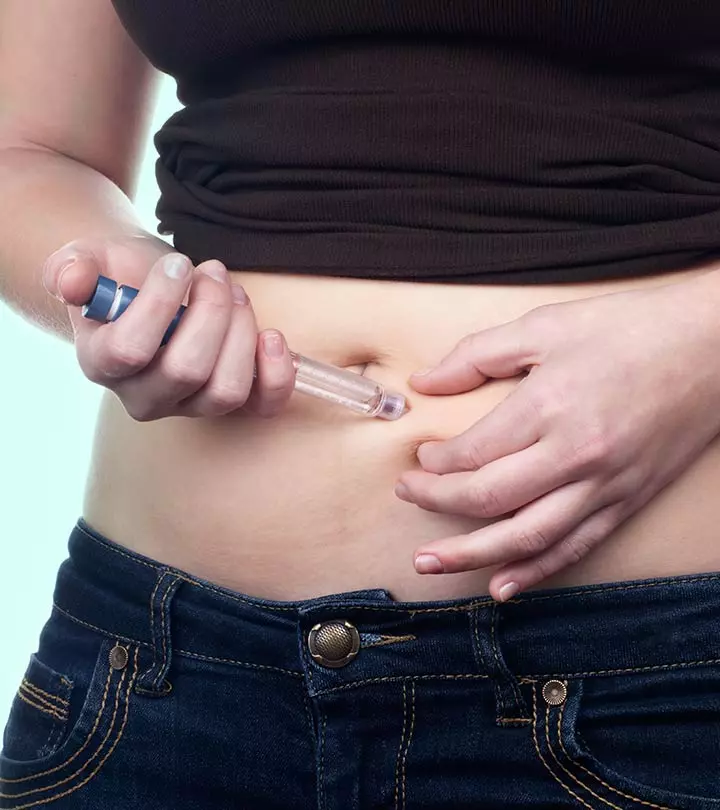

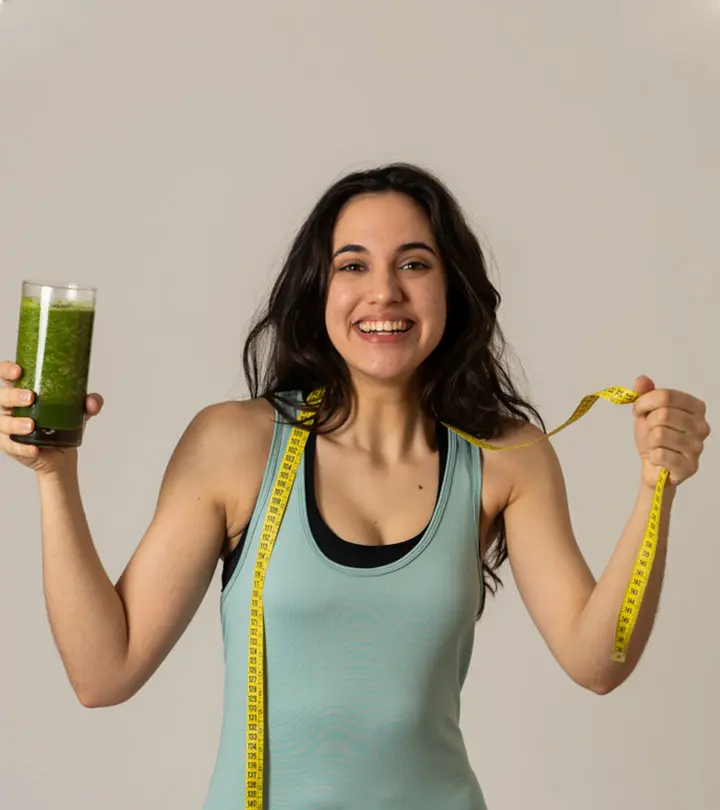






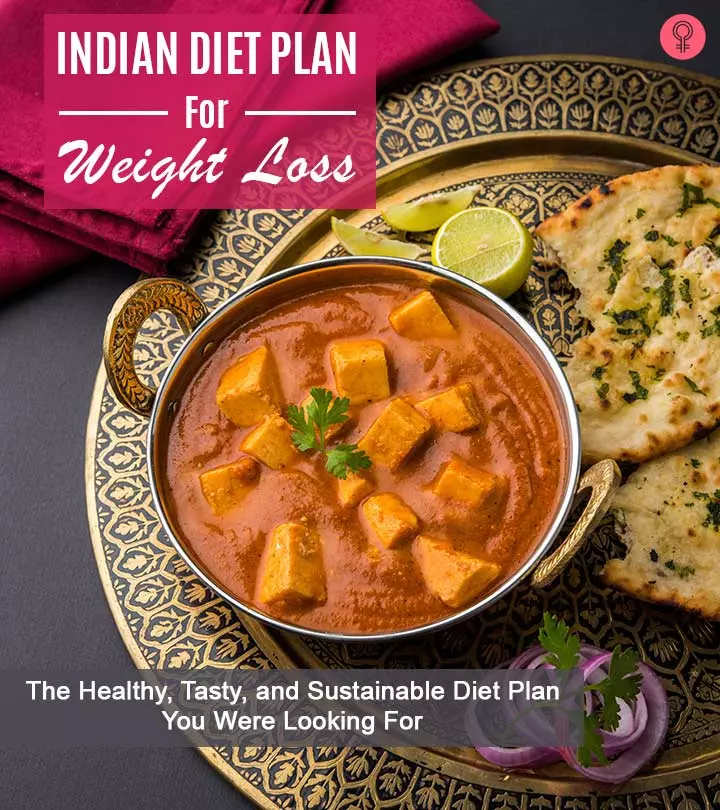

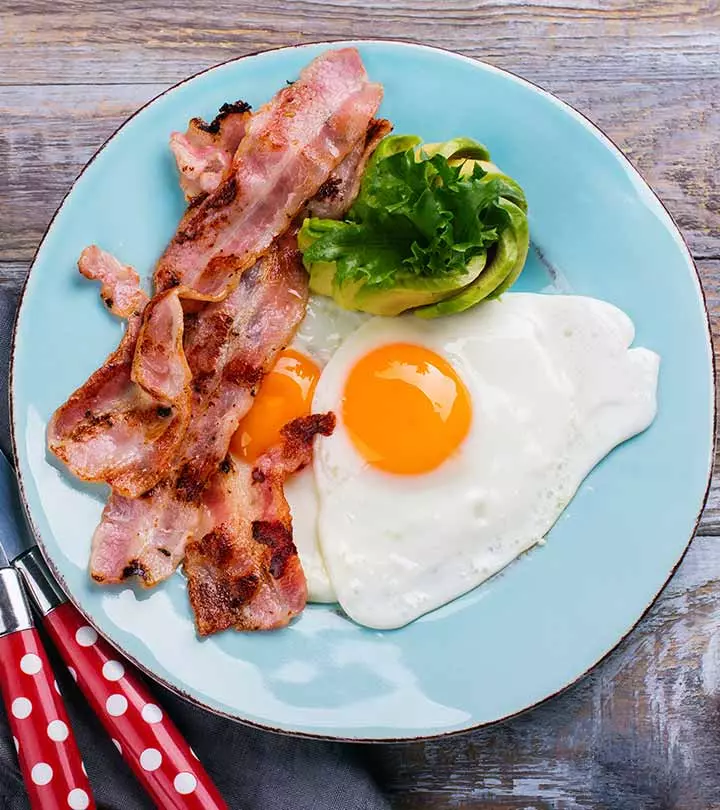

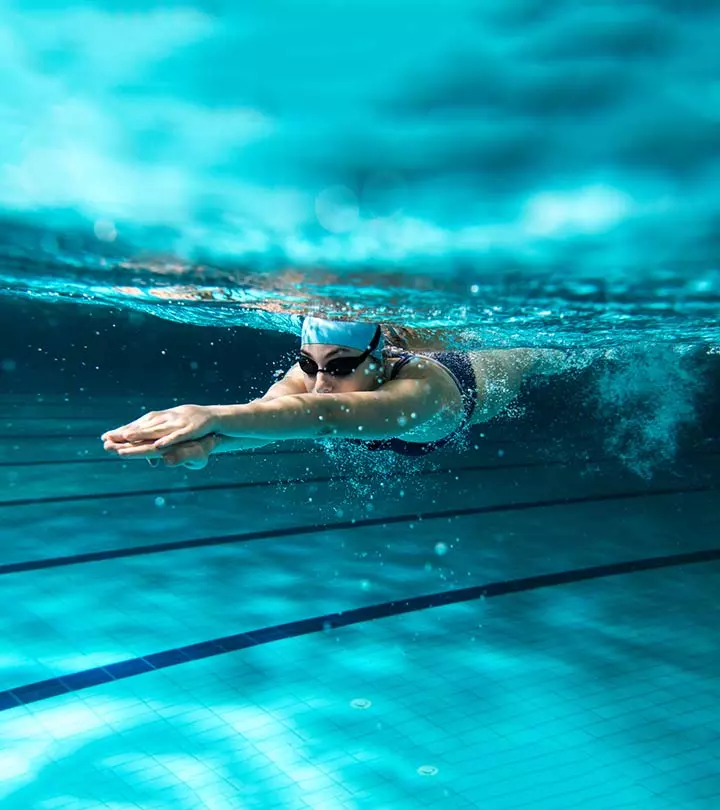


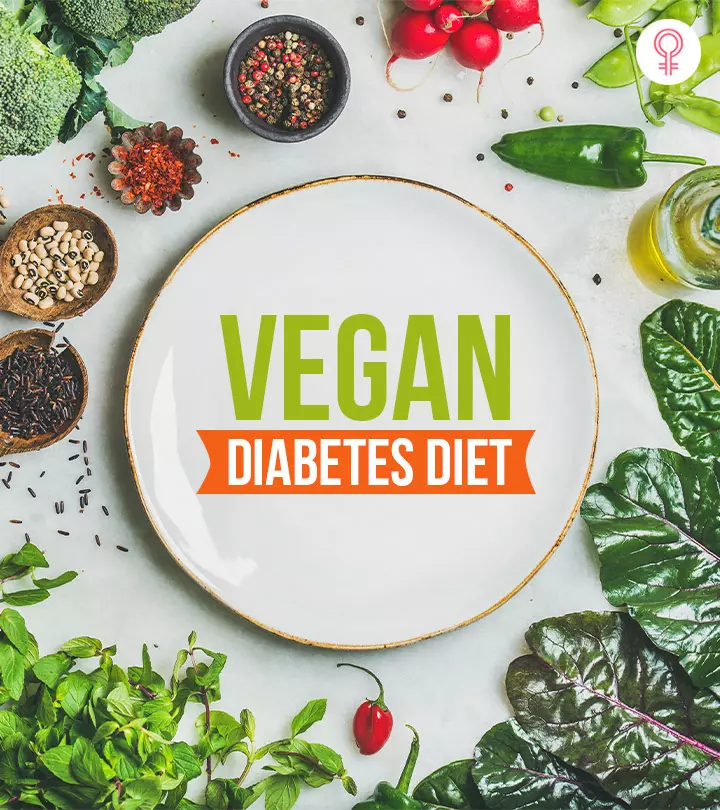
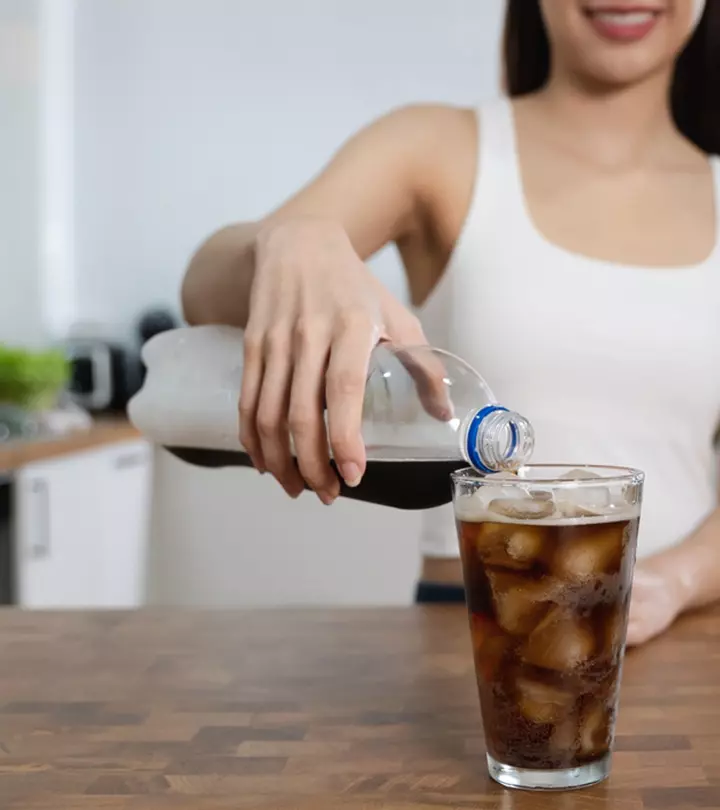


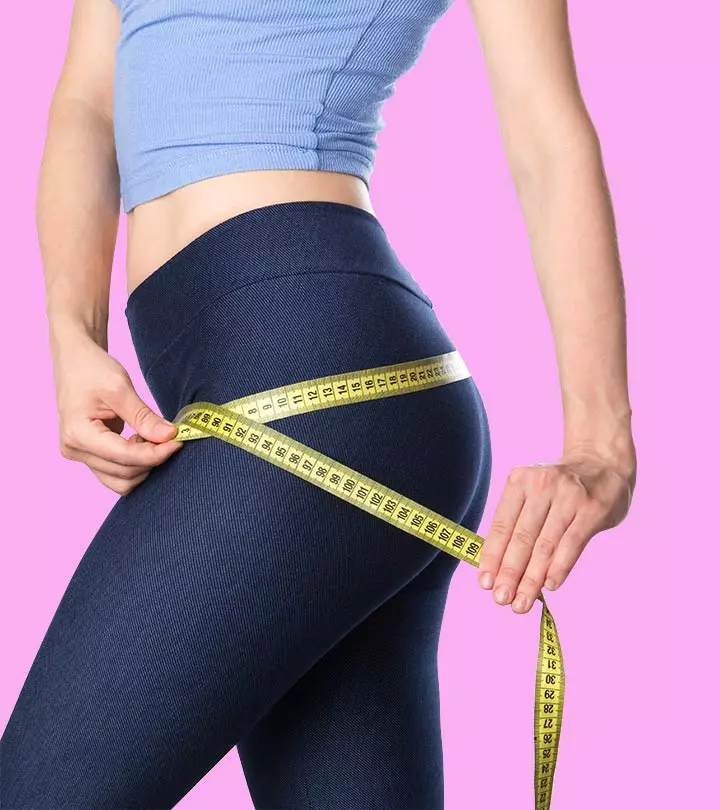
Community Experiences
Join the conversation and become a part of our empowering community! Share your stories, experiences, and insights to connect with other beauty, lifestyle, and health enthusiasts.